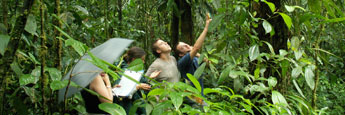![]() Every BU academic has a Research Professional account which delivers weekly emails detailing funding opportunities in their broad subject area. To really make the most of your Research Professional account, you should tailor it further by establishing additional alerts based on your specific area of expertise.
Every BU academic has a Research Professional account which delivers weekly emails detailing funding opportunities in their broad subject area. To really make the most of your Research Professional account, you should tailor it further by establishing additional alerts based on your specific area of expertise.
Research Professional have created several guides to help introduce users to ResearchProfessional. These can be downloaded here.
Quick Start Guide: Explains to users their first steps with the website, from creating an account to searching for content and setting up email alerts, all in the space of a single page.
User Guide: More detailed information covering all the key aspects of using ResearchProfessional.
Administrator Guide: A detailed description of the administrator functionality.
In addition to the above, there are a set of 2-3 minute videos online, designed to take a user through all the key features of ResearchProfessional. To access the videos, please use the following link: http://www.youtube.com/researchprofessional
Research Professional are running a series of online training broadcasts aimed at introducing users to the basics of creating and configuring their accounts on ResearchProfessional. They are holding monthly sessions, covering everything you need to get started with ResearchProfessional. The broadcast sessions will run for no more than 60 minutes, with the opportunity to ask questions via text chat. Each session will cover:
-
Self registration and logging in
-
Building searches
-
Setting personalised alerts
-
Saving and bookmarking items
-
Subscribing to news alerts
-
Configuring your personal profile
Each session will run between 10.00am and 11.00am (UK) on the fourth Tuesday of each month. You can register here for your preferred date:
27th November 2012: https://www1.gotomeeting.com/register/326491841
22nd January 2013: https://www1.gotomeeting.com/register/637298448
26th February 2013: https://www1.gotomeeting.com/register/267446504
26th March 2013: https://www1.gotomeeting.com/register/518275168
23rd April 2013: https://www1.gotomeeting.com/register/255287520
28th May 2013: https://www1.gotomeeting.com/register/806064201
25th June 2013: https://www1.gotomeeting.com/register/492839664
23rd July 2013: https://www1.gotomeeting.com/register/771246561
27th August 2013: https://www1.gotomeeting.com/register/398714217
24th September 2013: https://www1.gotomeeting.com/register/882372120
These are free and comprehensive training sessions and so this is a good opportunity to get to grips with how Research Professional can work for you.






 Professor Ruth Soetendorp, Associate Director of the Centre for Intellectual Property Policy and Management (CIPPM) in the Business School has been quoted in the Financial Times.
Professor Ruth Soetendorp, Associate Director of the Centre for Intellectual Property Policy and Management (CIPPM) in the Business School has been quoted in the Financial Times. 


 BU was well represented with poster presentations from Vanora Hundley, Professor of Midwifery, and Emma Pitchforth, Visiting Fellow.
BU was well represented with poster presentations from Vanora Hundley, Professor of Midwifery, and Emma Pitchforth, Visiting Fellow.
















 April’s Café Scientifique – Should we help machines understand and respond to our emotions?
April’s Café Scientifique – Should we help machines understand and respond to our emotions? Postgraduate Research Experience Survey (PRES) 2024 – 2 WEEKS LEFT
Postgraduate Research Experience Survey (PRES) 2024 – 2 WEEKS LEFT Working with The Conversation: online training session – Wednesday 8th May
Working with The Conversation: online training session – Wednesday 8th May Apply for up to £1,000 to deliver an event and take part in a national festival of public engagement with research
Apply for up to £1,000 to deliver an event and take part in a national festival of public engagement with research MSCA Postdoctoral Fellowships 2024
MSCA Postdoctoral Fellowships 2024 Horizon Europe News – December 2023
Horizon Europe News – December 2023